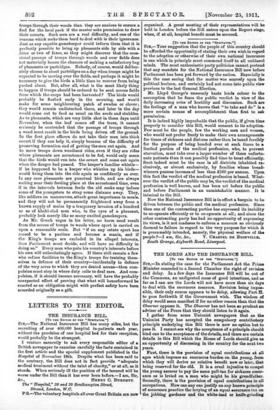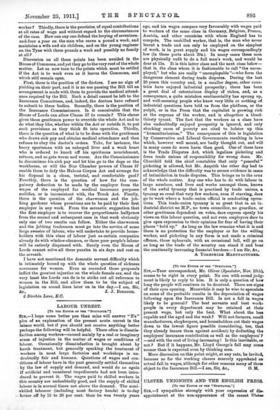THE LORDS AN]) THE ENS - I:TRANCE BILL.
[To TEE EDITOR OF TEE "SPECTATOR."] SIR,—In stating the case for the Parliament Act the Prime Minister conceded to a Second Chamber the right of revision and delay. In a few days the Insurance Bill will be out of the Commons, an undigested mass of good intentions, and as far as I can see the Lords will not have more than six days to deal with the enormous measure. Revision being impos- sible, their only coarse appears to be delay, allowing Part H. to pass forthwith if the Government wish. The wisdom of delay would seem manifest if for no other reason than that the Observer opposes it. The Observer has not been so prudent an adviser of the Peers that they should listen to it again.
I gather from some Unionist newspapers that as the Unionist Party has accepted the compulsory contributory principle underlying this Bill there is now no option but to pass it. I cannot see why the acceptance of a principle should bind one to the acceptance of the details, and there are certain details in this Bill which the House of Lords should give ns an opportunity of discussing in the country for the next two years.
First, there is the provision of equal contributions at all ages which imposes an enormous burden on the young, from which they will derive no relative benefit now or later, that being reserved for the old. It is a cruel injustice to compel the young assurer to pay the same poll-tax for sickness assur- ance as is levied on a man who might be his grandfather. Secondly, there is the provision of equal contributions in all occupations. How can any one justify on any known principle of assurance practice the levying of an equal assurance tax on the jobbing gardener and the white-lead or knife-grinding worker ? Thirdly, there is the provision of equal contributions at all rates of wage and without regard to the circumstances of the case. How can any one defend the levying of seventeen- and-four a year on the man who earns a pound a week, and maintains a wife and six children, and on the young engineer on the Tyne with three pounds a week and possibly no family at all Discussion on all these points has been avoided in the House of Commons, and yet they go to the very root of the whole matter. Let us now turn to the points which must be settled if the Act is to work even as it leaves the Commons, and which still remain open.
First, there is the position of the doctors. I see no sign of yielding on their part, and it is no use passing the Bill till an arrangement is made with them to provide the medical attend- ance required by the Bill, Such a detail cannot be left to the Insurance Committees, and, indeed, the doctors have refused to submit to these bodies. Secondly, there is the position of the Insurance Commissioners. Is it conceivable that the House of Lords can allow Clause 57 to remain ? This clause gives these gentlemen power to override the whole Act and to do what they like, whether within the Act or outside it, to put such provisions as they think fit into operation. Thirdly, there is the question of what is to be done with the gentleman who draws sick pay and obtains medical attendance and then refuses to obey the doctor's orders. Take, for instance, the beery sportsman with an enlarged liver and a weak heart who is ordered to knock off his spirituous nourishment, refuses, and so gets worse and worse. Are the Commissioners to discontinue his sick pay and let him go to the dogs or the workhouse, or will the Star Chamber powers of Clause 57 enable them to defy the Habeas Corpus Act and arrange for his disposal in a clean, teetotal, and comfortable gaol P Fourthly, there is the question of how far the com- pulsory deduction to be made by the employer from the wages of the employed for medical insurance purposes nullifies, or is inconsistent with, the Truck Act. Finally, there is the question of the charwoman and the job- bing gardener whose premiums are to be paid by their first employer in any week. From the sarcastic suggestion that the first employer is to recover the proportionate halfpence from the second and subsequent ones in that week obviously only one of two results can follow. Either the charwomen and the jobbing tradesmen must go into the service of some large sweater of labour, who will undertake to provide house- holders with this class of labour just as certain companies already do with window-cleaners, or these poor people's labour will be entirely dispensed with. Surely even the House of Lords cannot solve all these puzzles in six days and rest on the seventh.
I have not mentioned the domestic servant difficulty which is intimately bound up with the whole question of sickness assurance for women. Even as amended these proposals inflict the greatest injustice on the whole female sex, and the very least the Lords can do is to strike out all reference to women in the Bill, and allow them to be the subject of legislation on sound lines later on in the day.—I am, Sir,



















































 Previous page
Previous page